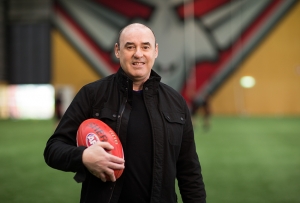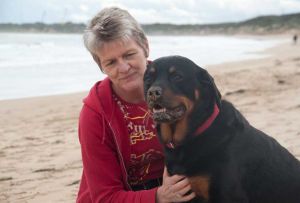Displaying items by tag: bipolar disorder
Celebrating World Bipolar Day at SANE and how you can get involved
Did you know 1.3% of Australians are living with bipolar disorder?
Each year on World Bipolar Day, SANE celebrates the achievements and voices of people living with bipolar, encouraging everyone to learn more and reduce stigma for people with this diagnosis.
Whether you're living with bipolar, or care about someone who is, take a look at the many ways you can join the discussion on World Bipolar Day 2021, taking place Tuesday 30 March. This year, we're putting the focus on bipolar disorder and relationships, providing resources, online discussions, Q&As, and hosting lived experience perspectives on this topic.
Tilly
My mental health toolbox
I am not bipolar. I have bipolar disorder. My diagnosis and my identity are linked only in so far as experiencing mental illness has contributed to my personal growth.
My perspectives have broadened, my empathy has grown and I have consolidated certain personal attributes such as resilience and confidence. I have also gradually created a toolbox — one that is instrumental to maintaining my mental health.
I wish the process had have been easier and quicker. But, at the end of the day all that matters is I now have it as I move forward with life.
 My mental illness at times caused much distress. Since my first episode of illness, a gradual process of receiving professional help, reaching out for support around me, improving my own understanding and self-awareness, and developing a tool kit of self care and coping strategies has allowed me to evolve from struggle to recovery and ongoing management
My mental illness at times caused much distress. Since my first episode of illness, a gradual process of receiving professional help, reaching out for support around me, improving my own understanding and self-awareness, and developing a tool kit of self care and coping strategies has allowed me to evolve from struggle to recovery and ongoing management
I am able to live, enjoy and adventure in spite of having a complex mental illness.
My handle on my condition is strong. I experience warning signs of mania, including restlessness, erratic or racing thoughts, difficulty sleeping and urges to complete unnecessary tasks. Recently I reflected that, although I can identify them (an important step which itself took time to achieve), I was struggling to deal with them in the moment.
I decided to contact a psychologist for guidance around developing coping strategies and ways to approach calming these symptoms better. My GP set up the referral, commending my proactive choice to seek support even though my illness has little current impact on my day-to-day life.
I have learnt the hard way that reaching out for support early is crucial in staying on top of mental illness. A culture of help-seeking is vital for staying well.
When I was 17, my condition surfaced for the first time. I experienced depression for several months. Among my negative thoughts was guilt — a feeling that I had no reason to be depressed and it was silly to feel this way. Consequently, I was too ashamed to tell anyone.
I had a friend who noticed I was withdrawn and quiet, which was unlike my positive, bubbly self. She asked me if everything was ok and said they were there if I needed to talk. That showed me that people did want to help. Though I chose not to open up, being approached was comforting.
 However, I struggled in silence instead of reaching out for help, and things went from bad to worse. I fell into a period of prolonged mania and this meant my behaviour changed in a way which was, at first, not overtly noticeable to those around me.
However, I struggled in silence instead of reaching out for help, and things went from bad to worse. I fell into a period of prolonged mania and this meant my behaviour changed in a way which was, at first, not overtly noticeable to those around me.
Suddenly things rapidly became more acute as I transitioned into a psychotic episode. I had severe emotional distress, exacerbated from experiencing visual hallucinations and my ability to function at school and home derailed. I was taken to the doctor, and subsequently hospital emergency on my GPs directive. From the psychiatric evaluations, I was admitted to hospital to begin my recovery.
My illness had become so bad others needed to intervene. I often wonder what disruption and distress to me, my family and others around me could have been avoided if I had have sought help when I was struggling with depression, or if I had understood the changes in my behaviour as concerning and spoken up.
The exposure to professional help began my road to recovery. Initially I lacked awareness of my mental health and the necessary tools of to manage my illness.
My mood was returned to a range which enabled me to function at home and socially, and to finish year 12 with a positive prognosis. I was transferred to a community team consisting of a psychiatrist and a counsellor for ongoing care. I started university and enjoyed beginning a new phase of my life.
I was taking medication that was being progressively lowered, but I was struggling to cope with warning signs as my mental illness again reared its head.
I experienced a relapse, but this was a constructive turning point in how I would handle my condition. It represented certainty and I learned of the permanency of my diagnosis. I became motivated to learn about bipolar, my own signs and symptoms and the coping strategies and self-care techniques I could use.
This nuanced understanding of myself, my illness and what tools worked for me have helped me manage my condition and live my life with bipolar having minimal impact.
I still see my psychiatrist routinely, though this is now infrequent, and I seek the support of those around me when I need it.
I have learnt to say no, to prioritise time to rest my body and mind, to implement a strong sense of routine and scheduling, and to ensure I sleep adequately. I have activities I know help me to relax, energise or burn off steam, and I know when I need to use these to change my current behaviour.
It took time to establish what methods worked for me. Combining these methods with new thought-based strategies that I am developing with my psychologist has, for now, completed my tool kit for managing my mental illness.
It may be in future that other things arise, and new instruments for coping may be added, or others taken away. I have established professional medical support, a help-seeking culture, medication regime, self-care and behavioural coping strategies which together ensure I stay at my optimal mental health as much as possible.
It was by no means an easy path, but it was an important one, for me and those around me. Now I have created my toolbox, I can take it anywhere, to use as needed to keep my condition in check in order to continue getting on with my life.
'Be kind to your mind' is an initiative of SANE supported by Future Generation Global, in partnership with batyr.
Mark
1983 sticks out to me. I did a really bad pre-season. I was down, I couldn’t train properly. I felt like I had a really bad flu. That was the start of my mental health problems, but it was decades until I was diagnosed with depression and bipolar disorder.
I got recruited from the under 15s at Strathmore to play for the Essendon under 19s. When I was 17, I played my first game in the Essendon Seniors. I ended up at the Swans and in ‘89 I had one of my best years. I think I came third in the best and fairest.
Then things went downhill again in ‘91. I’d sit in the toilets before our warm up and I’d cry. Then I’d have to go and play a game, which was not only physically demanding, it was mentally exhausting. Mum was driving me to the airport after a game in Melbourne and I burst into tears. I said, “Mum, I can’t do this anymore. I’ve got to stop. I can’t take it.”
I was 28 at the time and there was no real understanding of mental health issues back then. It’s only in the last few years that organisations like SANE have really stood up and raised awareness. And with the AFL, it’s only really come about now with publicity around people like Buddy Franklin and Chris Yarran that the public and clubs are more aware. But there was just nothing like that.
Without footy, I had no discipline – to go to training, to stay off the grog, to keep fit. All that went out the window. I’d start going out on Friday nights and taking cocaine, and it got to a stage where I was basically doing coke every day. You lose everything – all your discipline, friends, money. I was so far gone, I was just leaving a path of destruction behind me.
Through a mate, I was offered a place in rehab. I didn’t have any medical insurance, so friends rallied around and raised the money. The day I was leaving, I had my bag and footy under my arm and opened the gate. There were about 50 people waiting and they all turned and looked at me. It hit me at once what I’d done to myself. It all hit me. And I decided to fight it.
I got diagnosed with bipolar disorder and depression when I was about 43. Since 18, people had been telling me to stop feeling sorry for myself, to stop being a sook. At 43 I finally found out what was wrong with me.
In late 2014 I decided to go to the Essendon past players Christmas barbeque. That year, Simon Madden was hosting it. He said, 'Mate, I don’t know how to talk to you, because I just don’t know what you’ve been through. What about we catch up for a coffee?'
That was a major step for me, to sit in a coffee shop with one of my old friends. I had distanced myself from friends and family for so long. And now to have someone to talk to on a daily basis − that’s been pretty important to me.
It’s such a big issue, the mental health issue. So many people suffer, and so many people just hide it. I can’t emphasise this enough – you have to talk to someone, you have to go and get help.
It will steer you in the right direction to make the right decisions in life, so you can go on and lead a normal and happy life.
I’m a living example that with help and support you can come out the other side.
Tania
Tania and her dog Kelsey make a striking pair as they walk every day near their home on the Victorian Surf Coast. Kelsey is a handsome Rottweiler and Tania a tall, fit woman in her 40s. Some days they head for the beach, other days along the banks of the Barwon River.
Although Tania enjoys the exercise, it’s the companionship with Kelsey and beauty of the surroundings that never fail to lift her spirits.
‘I love animals,’ she says, ‘and I particularly love dogs. Some of us with mental illness can become self-absorbed. Whenever I am with Kelsey, and particularly when we are out walking, I focus on her rather than myself. I am totally engaged in what she’s doing. There are lots of lovely places to walk and that exposure to the natural environment does have a positive impact on me.’
Tania moved back to Ocean Grove to be close to her friends and family, whose love and support, she says, have helped her accept and manage her illness effectively. (She was diagnosed with Bipolar disorder over 20 years ago.) Tania has a wide network of friends in the area and it was through them that she discovered another passion – the joys and benefits of music.
She and a group of friends get together every few weeks and make music. ‘About six of us play the guitar, a couple play the drums and we all sing. I find it extremely relaxing and good fun.’
Tania first became unwell in her 20s, while serving with the Victorian Police Force. She was diagnosed five years later and although the Police Force had been compassionate and understanding, she eventually decided to leave.
‘It was a very difficult decision to make as I was well supported within my workplace, and had good pay and work conditions – but my personality is such that I become over-involved in work and take work-stress home. Unfortunately stress is a significant trigger in becoming unwell.’
It was a decision that led Tania to embark on a new career. She completed a Bachelor of Education and Training at the University of Melbourne, and enjoyed the experience of being a mature-aged student. After graduating, she worked as a trainer, conducting team building with work groups, community groups and universities.
A few years later, Tania took part in a Bipolar group therapy program that covered education about the condition, early warning signs, triggers such as stress, and the importance of building relaxing and pleasurable activities into daily life. Tania remembers what an eye-opener it was to discover that Bipolar is not a one-size-fits-all illness.
‘My involvement in the course was rewarding and inspiring, and while it sounds like a cliché, it did change my life.’

The program prompted Tania to change jobs once more and move into the area of mental health. She felt she could make a significant contribution not only through her skills as a presenter and trainer, but also her years of accumulated knowledge, personal experience and insight. She now works for Barwon Health, coordinating and facilitating Mental Health First Aid to work and community groups.
Tania admits it took her some time to learn how to manage her illness well, that her family and friends have helped her through some difficult times and that, although she is good at monitoring herself, they also keep an eye out for her.
‘They’re very good at saying to me, ‘Tan, are you a bit buzzy? You seem a bit “whatever.”’ I am able to hear this and usually what I do is go away and reflect on it and say, ‘Actually, I’m OK’ or ‘No, I’m not very good.’
Last year, Tania set herself the goal of becoming much fitter again. This has always been an important part of her life but she was not following any regime apart from walking.
‘The fitter you are physically, the more likely you are to keep good health mentally,’ she says.
In the midst of her busy days, Tania scarcely has time to draw breath. ‘I live a rich life,’ she says. ‘I am blessed with a loving family and friends and my loyal companion Kelsey. I have meaningful work and am able to use my experience of living with mental illness to educate and help others.
‘I have great work colleagues who are very supportive but my challenge for the future is to relax more, think less, and enjoy every bit of the journey.’
Terese
Terese is a mother of three young boys who lives in northern Sydney. Busy teaching, writing and looking after her family, Terese’s life today is a long way from when she experienced her first episode of Bipolar disorder in her late teens. It has taken over twenty years to pull her life together, she says.
Now in her 40s, Terese discovered the joys of poetry as a girl, winning creative writing competitions in high school. She has never stopped writing, even when diagnosed with Bipolar disorder at 19, and during those times since when she has been unwell.
‘A lot of people with Bipolar are writers,’ she says. ‘When you have the flow of energy there is an increased ability to write creatively. I use these periods to get a move on and write more poetry. I also tend to feel things at a deeper level then, and that experience of life is what I draw upon.'
Education is another passion, one which Terese initially walked away from when she was first hospitalised. She comes from a teaching family and was doing her Bachelor of Teaching at Macquarie University when her grandmother said, ‘You’ll never be able to work as a teacher. It’s simply not an option for you.’
Many years later, Terese’s involvement in mental health advocacy in high schools reignited her dream of teaching. She successfully undertook postgraduate studies and now works regularly as a casual teacher.
Terese’s psychiatrist feels she should limit the amount of teaching she does, as it is such demanding work. Terese does not always agree.
‘Like everyone, it’s important for me to find the life/work balance that suits me and because I have Bipolar, I try not to overload myself,’ she says.
Terese’s enthusiasm and engagement with life is strongly supported by her network of friendships. One of her closest friends is Kate. The two women got to know each other as mothers of small children. Kate only gradually realised that as well as parenting her three boys, Terese was also grappling with mental illness.
‘There are lots of challenges and I think it can be isolating,’ Kate says. ‘It was an eye-opener for me and I really admire Terese. When she helps my boys with their homework I can see what an extraordinary teacher she is.’ On one occasion Kate realised Terese was unwell and hadn’t taken her medication. She scooped her up, took her to the chemist, filled the prescription and told her, ‘You’ve just got to go back on your medication, make another appointment to see your doctor, and keep going.’
Terese was immensely grateful for such practical help. ‘Kate is very supportive and not in my face all the time asking me how I am,’ she says, ‘but when I was really unwell she was there for me.’

The two friends are founding members of a book club which has been running for over ten years. For Terese it is an outlet for her love of literature, as well as a close connection with a group of like-minded women.
Kate sees Terese as a strong presence in the book group. ‘She pulls us all together with inspiring emails and had often brought something linked to the book such as food described in it when we were first meeting. She also brings valuable insights and is brilliant at picking apart the prose. I think what we offer her is a contribution to the rhythms of her life.’
When Terese believes in a cause, she becomes actively engaged in supporting it. Her commitment to feminism, for example, led her to join the Women’s Electoral Lobby. She would take her youngest son when he was a baby and put him in a playpen in the corner of the office when she did membership work.
Terese is also involved in her local community. She lives in part of Sydney where the native bush and built heritage are greatly valued by residents, and is actively involved in the local bush care and building conservation groups.
Much as she loves all the different facets of her life, Terese is aware that she needs to guard against a tendency to travel at a million miles an hour, to be everything for everybody and have no time for herself. Her friend Kate is one of the people in her life who can gently remind her from time to time to put the brakes on – that her boys are only young, and that sometimes she just needs to be centred on being herself.
Bipolar disorder
Quick facts
- Bipolar disorder causes people to experience extreme mood changes.
- These mood changes include periods of depression and periods of mania or hypomania.
- Many people living with bipolar can benefit from self-help strategies, medication, community support, and psychological therapies.
- A full and meaningful life is possible for people living with bipolar disorder.
-
What is bipolar disorder?
Bipolar disorder (once called manic depression) causes people to experience extreme changes in mood, thinking, energy and behaviour.
Everyone experiences mood swings, or times when we feel joyful or low. But people living with bipolar disorder experience more extreme types of mood changes, that can significantly impact on day-to-day life.
Many people living with bipolar disorder also experience other mental health issues, including anxiety disorders, substance use disorders, personality disorders, and attention-deficit hyperactivity disorder1.
-
Symptoms of bipolar disorder
Bipolar and related disorders are characterised by periods of mania (extreme ‘highs’) and periods of depression (extreme ‘lows’). Symptoms usually first appear in late adolescence or early adulthood.
It is quite a diverse condition. Some people may only experience one episode of mania, but others experience more rapid cycles. Many people experience periods of normal mood in between episodes. Some people’s lives are affected significantly, but others experience only minor challenges.
There are three related presentations that share similar features2:
- Bipolar I disorder: which involves at least one episode of mania.
- Bipolar II disorder: involving at least one episode of hypomania.
- Cyclothymic disorder: involving chronic, fluctuating mood changes, including hypomanic symptoms (but not a full period of hypomania).
Mania
Mania is a period of unusually elevated or irritable mood and activity, lasting at least one week. A manic episode is severe enough to cause difficulties in important areas of life, like work or relationships. Many people experiencing a manic episode need a stay in hospital.
A manic episode involves three or more of the following2:
- Very high self-esteem, confidence, or sense of importance
- Needing less sleep
- Being very talkative
- Racing thoughts
- Being easily distractable
- Increased goal-directed activity, or agitation
- Risky behaviour or doing something reckless
Many people also experience symptoms of psychosis, such as hallucinations or delusions, during mania1.
Hypomania
Hypomania is like a milder form of mania – it lies between a feeling of normal elation and mania. Hypomania also involves unusually elevated or irritable mood or activity, but it’s shorter (lasting at least four days). It also involves three or more of the symptoms listed above2.
Hypomania involves a clear change in functioning but is less disruptive to a person’s life and does not require treatment or a stay in hospital.
Depressive episodes
Depressive episodes involve more than ordinary sadness. People with bipolar disorder may experience five or more of these symptoms over at least a two week period2:
- Feeling depressed, sad, empty, hopeless, or agitated.
- A loss of interest or pleasure in activities.
- Significant weight changes.
- Sleeping too much or having trouble sleeping.
- Feeling slowed-down physically or agitated.
- Fatigue or lack of energy.
- Seeing things in a negative way, feeling worthless or guilty.
- Having difficulty concentrating or making decisions.
- Suicidal thoughts, planning, or attempts.
If you, or someone you know, are concerned about suicide and need to talk to someone right now, call Lifeline on 13 11 14 or Suicide Call Back Service on 1300 659 467. If life is in danger and you need help immediately, please call triple zero (000).
-
Causes of bipolar disorder
The causes of bipolar disorder are not fully understood. There seems to be a genetic link, meaning it can run in families. There are also neurological, biological, and environmental factors that contribute to the likelihood of developing bipolar disorder1.
-
How common is bipolar disorder?
Around 2% of Australian adults experience bipolar disorder each year5.
-
Managing life with bipolar disorder
People with bipolar disorder find different strategies helpful, such as:
- Learning more about bipolar disorder
- Establishing a support network of friends or family members
- Learning stress management techniques
- Looking after physical health, including getting regular physical health check-ups, improving sleep, exercising regularly, and avoiding drugs and alcohol
- Learning to recognise early signs of mania developing, such as a lack of sleep, an increase in energy, or racing thoughts (using apps to track mood and sleep can be helpful)
- Developing a wellness plan and sharing it with a support team
- Accessing peer support.
-
Treatment and support for bipolar disorder
Bipolar disorder is a long-term condition, meaning people may need support over time. Ideally, treatment and support decisions should be collaborative4.
It’s a good idea to first talk to a GP. A GP can provide information and referrals for assessment, treatment and support options, and monitor physical health.
Treatment can usually occur in the community, though during episodes of mania, sometimes people may need an inpatient hospital stay. Treatment often involves working with mental health professionals such as psychiatrists, psychologists, and case managers. Treatment can have a range of goals, such as understanding more about bipolar disorder, preventing episodes of mania or identifying them early, and managing different areas of life like work, study, and relationships.
Medication is usually recommended1. Certain medications called mood stabilisers can assist the brain to restore its normal chemical balance and help manage mood changes.
Psychological therapies can help manage symptoms of bipolar disorder, including cognitive behavioural therapy (CBT), family-focused therapy, dialectical behaviour therapy, and mindfulness-based CBT1. Some people also benefit from electroconvulsive therapy (ECT). People living with bipolar disorder can also benefit from community support programs.
-
Help for family and friends
The family and friends of someone experiencing bipolar disorder need care and support too — it’s okay for family and friends to set boundaries, and to prioritise their own physical and mental health.
There are many other people out there who share similar experience, and many services designed to help carers of people with mental health issues. Check out our Guide for Families and Friends for more info.
Effective medical, community, and psychological treatment is available, and a person experiencing bipolar disorder can live a fulfilling life.
To connect with others who get it, visit our online Forums. They’re safe, anonymous, and available 24/7.
-
Resources
- Self-care for managing mania - SANE blog
- Dov’s story - SANE Peer Ambassador
- Bipolar Australia
- Bipolar Caregivers - information for family & carers
-
References
1. Carvalho AF, Firth J, Vieta E. Bipolar Disorder. N Engl J Med [Internet]. 2020 Jul 1;383(1):58–66.
2. American Psychiatric Association. Diagnostic and statistical manual of mental disorders (5th ed.; DSM-5). In: 5th ed. American Psychiatric Association; 2013.
3. Australian Bureau of Statistics. National Survey of Mental Health and Wellbeing: Summary of Results [Internet]. 2008.
4. Woltmann E, Grogan-Kaylor A, Perron B, Georges H, Kilbourne AM, Bauer MS. Comparative effectiveness of collaborative chronic care models for mental health conditions across primary, specialty, and behavioral health care settings: systematic review and meta-analysis. Am J Psychiatry. 2012;169(8):790–804.
5. Australian Bureau of Statistics. National Study of Mental Health and Wellbeing: 2020-2021. 2022.




